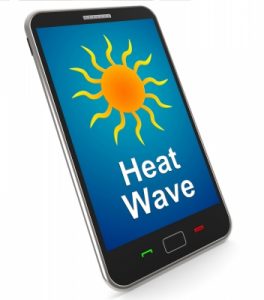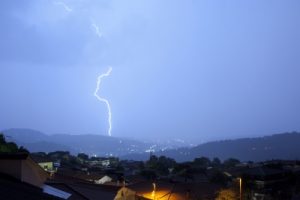
Knowledge Base / News
The latter half of the summer always tends to bring the threat of severe weather with it. Heat waves, humidity, severe storms and hurricanes, and unexpected weather changes can all have an impact on your business.
 In the past few months, we’ve seen heat waves set new records in locations all over the globe. As of the writing of this article, the northwestern United States and parts of Canada are about to get hit with a record-breaking heat wave. Earlier this summer, the UK and the southwestern part of the US set new records, as did Shanghai, China which saw its hottest day in 145 years!
In the past few months, we’ve seen heat waves set new records in locations all over the globe. As of the writing of this article, the northwestern United States and parts of Canada are about to get hit with a record-breaking heat wave. Earlier this summer, the UK and the southwestern part of the US set new records, as did Shanghai, China which saw its hottest day in 145 years!
When heat waves settle in, many factors start to work together in ways that can potentially cause downtime or data loss for your organization. The biggest issue is power loss – when air conditioning needs to run constantly, power grids become overwhelmed. Brownouts and blackouts quickly follow, and both extended downtime as well as electrical fluxes can damage your sensitive equipment, including servers, freezers, and network appliances.
Higher overall temperatures also leave your organization a far smaller window between the range where your servers and PCs can run, and the range where they begin to shut down due to overheating. Even if power loss isn’t a concern, overheating should be, especially if an overworked HVAC unit fails when you can least afford it, such as overnight or during a weekend when your facility isn’t staffed. It’s important to proactively monitor your temperature and power to remain alert to situations that could lead to downtime.
Thick, heavy humidity is felt by more than just employees as they make their way from their cars or public transportation into your facility. Higher amounts of moisture in the air work their way into everything within your facility, including all of your electronic equipment and computers. Higher levels of moisture will lead to buildup on motherboards, exposed wiring, and connecting sockets, all of which can lead to hardware failure.
Air conditioning will help reduce the amount of moisture in the air during humid conditions, however as noted earlier unexpected HVAC failure due to being overworked or even power loss due to overloaded electrical grids can lead to extremely humid conditions very quickly. Having the ability to monitor the humidity, as well as relative humidity, in your facilities will help you keep your equipment up and running, as well as making sure the working conditions for your employees aren’t harmful to their health.
 Hurricane season is upon us here in the United States, and some areas have already felt the brunt of heavy rain and damaging winds. Some storms can form quickly, leaving you with only a short time to make sure your facility and all your assets are monitored and protected.
Hurricane season is upon us here in the United States, and some areas have already felt the brunt of heavy rain and damaging winds. Some storms can form quickly, leaving you with only a short time to make sure your facility and all your assets are monitored and protected.
Areas that aren’t close to the coast are still subject to severe weather, which can cause physical damage to buildings as well as flood conditions. Even something as benign as a cracked window can lead to a water leak in your basement… which could be very problematic if your administrative office, and all its computers and accounting server, are located there.
When “monitoring for flood conditions” is mentioned, it seems to invoke the image of raging floodwaters racing down Main Street, USA. In reality, a burst pipe that causes water to leak down the walls of your building, or damaged roof tiles causing water to cascade through your ceiling are all considered to be flood conditions, and are more than worthy of proactively monitoring against.
Protect Your Facility Against Weather-Related Downtime
Even as we find ourselves in the middle of an extreme weather season, your organization still has time to implement proactive environment monitoring to help stay protected. You don’t wait until after an accident to purchase insurance, nor should you wait until after your data has been hacked to install a firewall. Likewise, you shouldn’t wait until after a heat wave, high humidity, or a sudden storm cause you downtime to begin proactively monitoring environmental conditions. The sooner you’re aware of potentially damaging conditions, the higher the opportunity to counteract them and protect your data, your assets, and your business.
If your organization isn’t yet proactively monitoring environment conditions the same way you proactively monitor your network against hacking, or your building against intrusion and theft, please let us know. Our nearly 30 years of experience can be trusted to help you put together a custom-fit environment monitoring solution and help to keep you protected. Don’t let heat, humidity, water, or any other factor damage your business or your revenue, and always remember that ‘proactive monitoring’ is better than ‘disaster recovery’!

You may find Windows Command Prompt at the following path:
To run Windows Command Prompt as an administrator:
| Current S models | Current E models |
|---|---|
| Room Alert 32S | Room Alert 32E |
| Room Alert 12S | Room Alert 12E |
| Room Alert 3S | Room Alert 4E |
| Room Alert 3E | |
| S models | E & W models |
|---|---|
| Room Alert 32S | Room Alert 32E |
| Room Alert 12S | Room Alert 12E |
| Room Alert 3S | Room Alert 4E |
| Room Alert 3E | |
| Room Alert 3W |
| Model |
|---|
| Room Alert MAX |
| Room Alert 32S |
| Room Alert 12S |
| Room Alert 3S |
| Room Alert 32E/W |
| Room Alert 12E |
| Room Alert 4E |
| Room Alert 3E |
| Room Alert 3 Wi-Fi |